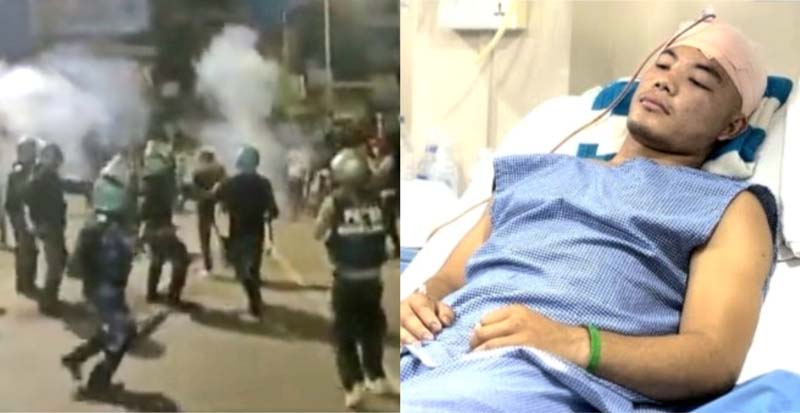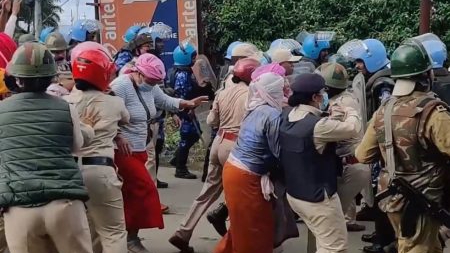Youth Survives Brutal Pellet Attack by Security Forces in Manipur

Youth Survives Brutal Pellet Attack by Security Forces in Manipur
In a harrowing incident that has sent shockwaves through Manipur, a 21-year-old youth named Uttam Soibam narrowly escaped death after being subjected to a barrage of pellets allegedly fired by the Rapid Action Force (RAF) during a tumultuous clash between security forces and agitated protesters. The incident, which occurred amidst a backdrop of student-led protests in the region, has left the entire nation in stunned disbelief.
Uttam Soibam’s ordeal unfolded against the backdrop of escalating tensions in Manipur, where a wave of student-led protests had engulfed the state. These demonstrations were triggered by the horrifying discovery of photographs depicting the lifeless bodies of two students, their youthful promise extinguished prematurely in a manner that struck a chord with people across the nation.
The 21-year-old survivor, Uttam Soibam, now bears the physical scars of his confrontation with security forces. Reports from medical professionals reveal that an astonishing 61 pellets have been painstakingly extracted from his body. Yet, a haunting revelation remains: there are still more pellets lodged within his flesh, a grim testament to the brutal force with which he was assaulted.
The incident, which has garnered significant attention from various quarters, has rekindled discussions about the use of pellet guns by security forces in controlling public protests. Pellet guns, often touted as “non-lethal” weapons, have faced criticism for their potential to cause severe injuries and even fatalities. The case of Uttam Soibam, who miraculously survived the pellet onslaught, serves as a stark reminder of the devastating consequences that these seemingly innocuous projectiles can inflict.

Witnesses to the incident claim that Uttam Soibam was participating in the protests when the situation took a drastic turn. The Rapid Action Force, a specialized unit of the Indian paramilitary forces, was deployed to quell the unrest. As tensions flared, the situation spiraled out of control, culminating in the horrifying attack on the young protester. It remains a matter of dispute whether the use of pellet guns was justified in this context, or if alternative, less lethal crowd control methods could have been employed.
The aftermath of the incident has seen Manipur descend into further chaos, with clashes between protesters and security forces intensifying. The visuals of Uttam Soibam’s pellet-riddled body, circulated widely on social media, have become a rallying point for those demanding justice and accountability. The incident has galvanized not only the local population but also human rights activists and concerned citizens across the country.
Uttam Soibam’s story underscores the urgent need for a comprehensive review of crowd control tactics employed by security forces. While maintaining law and order is essential, the cost of human lives and injuries, as seen in this instance, raises crucial questions about the methods and equipment used.
In response to growing outrage, various political leaders and activists have called for a thorough investigation into the incident. They demand that those responsible for the excessive use of force be held accountable, and that stringent measures be taken to prevent the recurrence of such traumatic incidents.
The case of Uttam Soibam serves as a stark reminder of the need to safeguard the fundamental right to protest peacefully and express dissent without fear of life-altering consequences. It also highlights the responsibility of security forces to exercise restraint and prioritize the protection of citizens’ lives, even in challenging situations.
As Uttam Soibam continues his arduous journey towards physical recovery, his resilience and the shocking ordeal he endured have become emblematic of a broader struggle for justice, human rights, and accountability. His story stands as a testament to the unwavering spirit of those who refuse to be silenced, even in the face of overwhelming adversity.
In the wake of Uttam Soibam’s traumatic experience, the incident has sparked a nationwide discourse on the importance of safeguarding the rights of individuals to peacefully voice their concerns and dissent. The use of pellet guns as a means of crowd control has been a contentious issue for several years, with human rights organizations and activists consistently calling for their ban. The incident in Manipur has now reignited this debate with renewed vigor, placing it firmly under the spotlight of public scrutiny.
Proponents of non-lethal crowd control methods argue that alternatives, such as water cannons, tear gas, or rubber bullets, should be employed to minimize harm to civilians during protests. They emphasize that the use of pellet guns, which can cause grievous injuries and lifelong trauma, is disproportionate and goes against the principles of proportionality in the use of force by security personnel.

Meanwhile, government authorities have responded by asserting that security forces often face challenging and volatile situations when dealing with large-scale protests, and that they must have tools at their disposal to maintain public order. However, the Manipur incident has once again raised questions about the adequacy of training and guidelines provided to security personnel regarding the use of force, particularly when dealing with crowds predominantly comprising students and young people.
As the nation watches and waits for developments in Uttam Soibam’s case, the incident serves as a stark reminder of the fragility of democratic values and the importance of a responsible and responsive security apparatus. It underscores the need for an open dialogue between authorities, civil society, and citizens to address the concerns surrounding the use of force during public protests and to ensure that such tragic incidents do not recur in the future. In the pursuit of justice, healing, and accountability, the nation stands united, demanding answers and striving to ensure that the rights and safety of its citizens are upheld at all costs.



